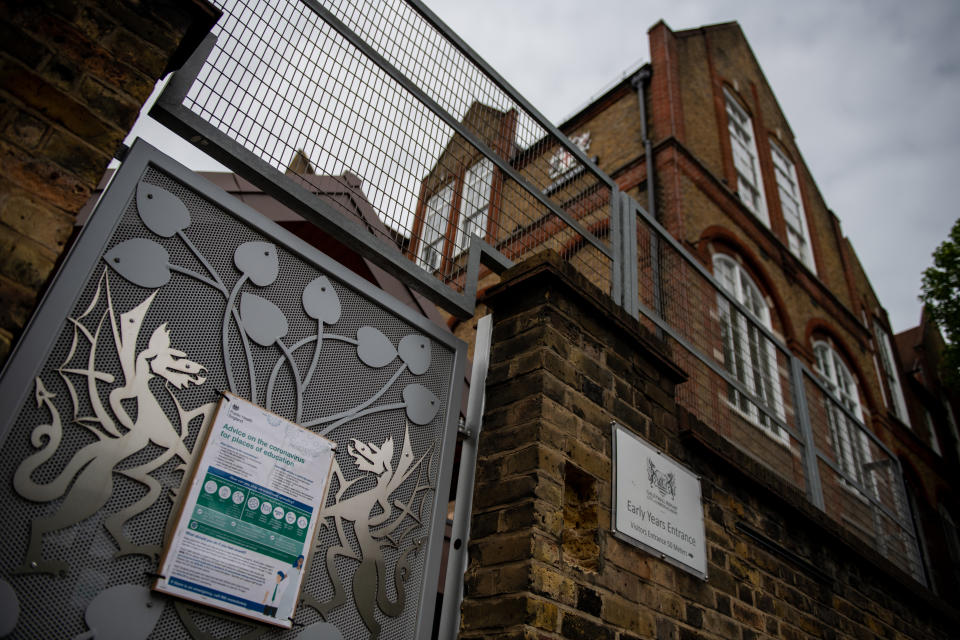Coronavirus: Government 'will make schools decision just four days before planned reopening date'
The government will make its decision on the reopening of schools just four days before the planned starting date, a teaching union has claimed.
Under Boris Johnson’s plan to ease coronavirus lockdown restrictions, some schools in England are set to be reopened from the week beginning 1 June.
But the government is being criticised over the proposal, with teachers, doctors and parents reluctant to send children back to school during the COVID-19 pandemic.
On Sunday, the headteachers union ASCL claimed the government will not make its decision until just four days before 1 June.
General secretary Geoff Barton said: “It is important to understand that the government will only make the final decision on whether to press ahead with the reopening of schools when it reviews the latest science on 28 May, and that if the evidence does not support this decision at that time, it will be delayed.”

The ASCL gave cautious support to the government plan to reopen schools from the start of June, but insisted there are “important caveats”.
Barton said: “There are several aspects of the detail which still concern us, particularly around the idea of schools being asked to bring all eligible primary children in full-time from 1 June.
“Given the short time frame and the extensive preparations that must be made, we are asking the government to recognise that many schools may find this impossible, and to be more flexible.”
However, on Monday, Downing Street insisted the decision on whether schools will return next month will be made this week.

The prime minister’s spokesman said: “You can see from the discussions that have been taking place that we have been seeking to resolve this as soon as we can.”
He said the government continues to “want to work with schools in order to get more children back into an education setting”.
The spokesman said: “We are now past the peak of the virus and so it is right that we plan for the first phase of a controlled and careful return of some year groups from 1 June at the earliest.
“As we have always said, safety comes first, but we must also be aware of the potential damage to a child’s education from not getting them back in the classroom.”
Latest coronavirus news, updates and advice
Live: Follow all the latest updates from the UK and around the world
Fact-checker: The number of COVID-19 cases in your local area
6 charts and maps that explain how COVID-19 is spreading
One Australian study reportedly being looked at by the government says children are “not the primary drivers of COVID-19 spread” in schools.
A senior member of the government’s Scientific Advisory Group for Emergencies (Sage) sub-committee on schools told The Daily Telegraph that the government had examined the study.
The paper, by the National Centre for Immunisation Research and Surveillance, considered all coronavirus cases in the schools of New South Wales, the country's most populous state.
Deputy chief medical officer for England Dr Jenny Harries has said Sage had modelled seven different scenarios for reopening schools.
But a survey has suggested poorer families are less likely to want to send their children back to school, despite these pupils having fewer opportunities for home learning.
Watch the video below
Children from better-off households are spending an additional 75 minutes a day on educational activities compared with their peers from the poorest households during the lockdown, the Institute for Fiscal Studies (IFS) found.
Pupils from the wealthiest families will have done seven full school days' worth of extra home learning by 1 June, according to the report.
If children do not go back to school until September, the gap between the most affluent and the poorest pupils will double to three school weeks, the study warned.
Paul Whiteman, general secretary of school leaders' union NAHT, said teachers wanted more clarification on whether schools are centres of transmission.
He told BBC Radio 4's Today programme on Monday: "Specifically around the transmission from children to adults, we've been told over the weekend – it's been asserted by the government publicly over the weekend – that there isn't the level of risk that we fear.
"However, we haven't yet seen the scientific underpin of that.
“There's been some commentary and I want to invite the government today to write to me so that I can talk to the 31,000 school leaders that we represent, particularly in the primary sector, and say this is why the government has made that assessment."
Kevin Courtney, joint general secretary of the National Education Union, said children should go back to school as soon as it is safe.
"For that to happen,” he said, “government needs to reassure parents and schools that it is safe to do so by publishing the science behind a June wider reopening, and have testing, tracking and tracing in place for reopening.”

 Yahoo News
Yahoo News 


